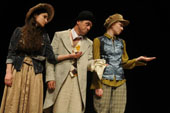4th Annual Tbilisi International Festival of Theatre heats up
By Salome Modebadze
Tuesday, September 25



In the frames of the fourth annual Tbilisi International Festival of Theatre, which kicked off on September 14-30, Striptease made the audience look inside their hearts and recollect how many times they had experienced the same as the two heroes standing on the stage of the Royal District Theatre.
The play, based on a Polish plot is filled with irony. Deprived of their freedom, the two men admit the tiniest guilt and forget their principles.
Director Nika Tavadze said it is not right to just stage a play; what you want to tell your audience is what is more important.
He said when something troubles or hurts you; you begin searching for a play that says everything you feel inside. “I chose this play because a lot of things troubled me in my life,” he told The Messenger.
The two main characters in Tavadze’s Striptease became victims of the system.
Tavadze stressed the importance of festivals in terms of showing your product not only to the local audience, but also to international guests. He said festivals provide an arena for exchanging professional skills, hearing and sharing opinions and experiences. “Theatre cannot be imagined without the audience and festivals,” Tavadze told us.
William Shakespeare’s As You Like It staged by Levan Tsuladze on Lasha Bugadze’s adapted text and accompanied by Vakhtang Kakhidze’s music, received “a standing ovation” at the Globe to Globe World Shakespeare Festival in 2012.
After the great success in Shakespeare’s homeland, the Marjanishvili Theatre premiered the play for the Tbilisi International Festival of Theatre on September 17.
Composer Vakhtang Kakhidze said that despite international success, it is always most important how you perform in your homeland. “Although the whole troupe was nervous, I think everything went very well and the audience welcomed the play,” Kakhidze told us.
Playwright Lasha Bugadze emphasized the difficulty of the play with its structure. He told The Messenger that if the audience at the Globe Theatre in London was actively engaged in the play (they stood on their feet like at a rally), the play became more “intimate” at Marjanishvili theatre’s stage.
Goga Tavadze’s After Magritte created a colorful mess on the stage when the exhibition of famous Belgian surrealist painter-Rene Magritte became the inspiration of a “surrealist investigation” at Rustaveli Theatre.
Famous Georgian actress, Nana Pachuashvili, performed as an old lady which troubled not only her own family but even the police inspector chasing after non-existing criminals.
Actor Goga Barbakadze enjoyed working on the play. He said there is a mess in the house and hoped that one day it will be cleaned forever. “Everyone is searching for the way out of the situation and we will find it,” he told The Messenger.
Announcing the start of the “fourth story” Festival director Ekaterina Mazmishvili encouraged everyone to join the festival’s team “and enjoy this precious period of risk and constant quest for something special.”
“Each year we repeat the same story – each year the festival starts from an empty page with wishes and hopes with ideas and thoughts that shape gradually and into something materialistic. After a long journey, despite mistakes and obstacles, with the help of muses and their servants, the empty space is filled with artists, the products of their imagination and later with audiences,” Mazmishvili said on behalf of the festival, emphasizing that the time when artists and audiences meet is the most tender and delicate page of the story that gives meaning to and inspires the festival.
